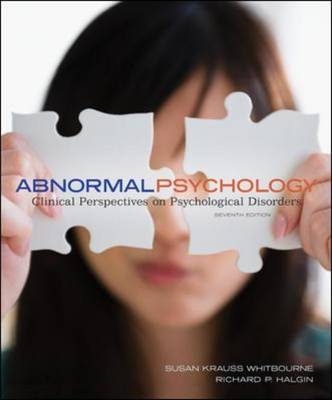
Abnormal Psychology: Clinical Perspectives on Psychological Disorders
McGraw-Hill Professional (Verlag)
978-0-07-803527-2 (ISBN)
- Titel ist leider vergriffen;
keine Neuauflage - Artikel merken
Susan Krauss Whitbourne and Richard Halgin’s Abnormal Psychology: Clinical Perspectives on Psychological Disorders, seventh edition includes coverage of anticipated changes in the DSM-5.
Presenting the Human Experience of Psychological Disorders. In Susan Krauss Whitbourne and Richard Halgin’s Abnormal Psychology: Clinical Perspectives on Psychological Disorders, students are shown the human side of Abnormal Psychology. Through the widespread use of current and relevant clinical case studies, and the biographies and first-person quotations in the Real Stories feature, students are presented with real-life portrayals of the disorders featured in the text. The text maintains the integrative approach to treatment using the biopsychosocial model, and acknowledges the evolution of psychological disorders over the lifespan. New to this edition is Connect Abnormal Psychology, with the groundbreaking adaptive learning diagnostic, LearnSmart and the revamped Faces of Abnormal Psychology, with a more vibrant narrator and efficient assignment and assessment capabilities.
Professor Whitbourne received her Ph. D. from Columbia University and has dual specializations in life-span developmental psychology and clinical psychology. She has taught at the State University of New York at Geneseo and the University of Rochester. At the University of Massachusetts, she received the University's Distinguished Teaching Award and the College of Arts and Sciences Outstanding Teacher Award. In 2002, she received the Florence Denmark/Psi Chi National Faculty Advisor Award and in 2003, the APA Division 20 (Adult Development and Aging) Master Mentor Award . She is the Honors Coordinator in the Psychology Department and the Director of the Office of National Scholarship Advisement in the newly established Commonwealth Honors College. The author of fourteen books and over one hundred journal articles and book chapters, Professor Whitbourne is regarded as an expert in the field of personality development in adulthood and old age. She is currently the APA Council Representative of Division 20 of APA having also served as Division 20 President. Professor Whitbourne has developed nationally recognized approaches to technological innovations in teaching, and the web site she developed for her introductory psychology course was selected as a McGraw-Hill Web Cafe "Site of the Month." Professor Halgin received his Ph. D. from Fordham University, and completed a 3-year fellowship in the Department of Psychiatry at New York Hospital-Cornell Medical Center, prior to joining the faculty of the University of Massachusetts in 1977. He is a Board Certified Clinical Psychologist and has had over two decades of clinical, supervisory, and consulting experience. At the University of Massachusetts, his course in Abnormal Psychology is one of the most popular offerings on campus, attracting an enrollment of more than 500 students each semester. In recent years, he has also offered this course at Amherst College and Smith College. His teaching has been recognized at the university and national level. A University of Massachusetts Alumni Distinguished Professor, he was honored with the University's Distinguished Teaching Award and his teaching was recognized by the Society for the Teaching of Psychology of the American Psychological Association. In April 2003, his teaching was highlighted in the Chronicle of Higher Education. Professor Halgin is the author of more than fifty journal articles and book chapters in the fields of psychotherapy, clinical supervision, and professional issues in psychology.
Chapter 1 Overview to Understanding Abnormal BehaviorLearning ObjectivesCase Report: Rebecca HasbrouckWhat Is Abnormal Behavior?The Social Impact of Psychological DisordersDefining AbnormalityWhat Causes Abnormal Behavior? Biological CausesPsychological Causes Sociocultural Causes The Biopsychosocial PerspectiveProminent Themes in Abnormal Psychology throughout HistorySpiritual ApproachHumanitarian ApproachScientific ApproachResearch Methods in Abnormal PsychologyExperimental DesignCorrelational DesignTypes of Research Studies SurveyLaboratory StudiesThe Case Study MethodSingle Case Experimental DesignInvestigations in Behavioral GeneticsBringing It All Together: Clinical PerspectivesReturn to the CaseTreatment OutcomeDr. Tobin’s ReflectionsSummaryKEY TERMSToward the DSM-5: Definition of a Mental Disorder You Be the Judge: Being Sane in Insane PlacesReal Stories: Vincent van Gogh: PsychosisChapter 2 Classification and Treatment PlansLearning ObjectivesCase Report: Peter DickinsonPsychological Disorder: Experiences of Client and ClinicianThe ClientThe ClinicianDiagnostic and Statistical Manual of Mental Disorders (DSM)Axis I: Clinical Disorders Axis II: Personality Disorders and Mental Retardation Axis III: General Medical Conditions Axis IV: Psychosocial and Environmental Problems Axis V: Global Assessment of FunctioningCulture-Bound SyndromesThe International Classification of Diseases (ICD) The Diagnostic ProcessDiagnostic ProceduresCase FormulationCultural FormulationPlanning the Treatment Goals of TreatmentTreatment SitePsychiatric HospitalsSpecialized Inpatient Treatment Centers Outpatient Treatment Halfway Houses and Day Treatment Programs Other Treatment Sites Modality of TreatmentDetermining the Best Approach to TreatmentThe Course of TreatmentThe Clinician’s Role in Treatment The Client’s Role in Treatment The Outcome of TreatmentRETURN TO THE CASECase ReportDr. Tobin’s ReflectionsSUMMARYKEY TERMSToward the DSM-5: Changes in the DSM-5 StructureYou Be the Judge: Psychologists as PrescribersReal Stories: Daniel Johnston: Mood DisturbanceChapter 3 AssessmentLearning ObjectivesCase Report: Ben RobshamCharacteristics of Psychological AssessmentsClinical InterviewMental Status ExaminationIntelligence TestingStanford-Binet Intelligence TestWechsler Intelligence Scales Personality TestingSelf-Report Tests Projective Testing Behavioral AssessmentMulticultural AssessmentNeuropsychological AssessmentNeuroimagingPutting It All TogetherRETURN TO THE CASECase ReportDr. Tobin’s ReflectionsSUMMARYKEY TERMSToward the DSM-5: Changes in Diagnostic AssessmentsYou Be the Judge: Psychologists in the Legal SystemReal Stories: Ludwig Van Beethoven: Bipolar disorderCHAPTER 4 Theoretical PerspectivesLearning ObjectivesCase Report: Meera KrishnanTheoretical Perspectives in Abnormal PsychologyBiological PerspectiveTheoriesTreatmentTrait TheoryPsychodynamic PerspectiveFreud’s TheoryPost-Freudian Psychodynamic ViewsTreatmentBehavioral PerspectiveTheoriesTreatment Cognitive PerspectiveTheoriesTreatmentHumanistic PerspectiveTheoriesTreatmentSociocultural PerspectiveTheoriesTreatment Biopsychosocial Perspectives on Theories and Treatments: An Integrative ApproachRETURN TO THE CASECase Report: Meera KrishnanSUMMARYKEY TERMSToward the DSM-5: Theoretical Approaches You Be the Judge: Evidence-Based PracticeReal Stories: Sylvia PlathCHAPTER 5 Anxiety DisordersLearning ObjectivesCase Report: Barbara Wilder The Nature of Anxiety DisordersPanic Disorder and Agoraphobia Theories and Treatment of Panic Disorder and AgoraphobiaBiological PerspectivesPsychological Perspectives Specific PhobiasTheories and Treatment of Specific PhobiasBiological Perspectives Psychological PerspectivesSocial PhobiaTheories and Treatment of Social PhobiaBiological Perspectives Psychological Perspectives Generalized Anxiety DisorderTheories and Treatment of Generalized Anxiety DisorderBiological PerspectivesPsychological PerspectivesObsessive-Compulsive DisorderTheories and Treatment of Obsessive-Compulsive DisorderBiological PerspectivesPsychological PerspectivesAcute Stress Disorder and Post-Traumatic Stress DisorderTheories and Treatment of Post-Traumatic Stress DisorderBiological Perspectives Psychological Perspectives Anxiety Disorders: The Biopsychosocial PerspectiveRETURN TO THE CASECase Report: Barbara WilderDr. Tobin’s ReflectionsSUMMARYKEY TERMSToward the DSM-5: Definition and Categorization of Anxiety DisordersYou Be the Judge: Psychiatric NeurosurgeryReal Stories: Paula Deen: Panic Disorder with AgoraphobiaCHAPTER 6 Somatoform Disorders, Psychological Factors ¬Affecting Medical Conditions, and Dissociative DisordersLearning ObjectivesCase Report: Rose MarstonSomatoform DisordersConversion DisorderSomatization Disorder and Related ConditionsHypochondriasisConditions Related to Somatoform DisordersBody Dysmorphic DisorderTheories and Treatment of Somatoform DisordersPsychological Factors Affecting Medical ConditionRelevant Concepts for Understanding Psychological Factors Affecting Medical ConditionStress and CopingEmotional ExpressionPersonality StyleApplications to Behavioral MedicineDissociative DisordersMajor Forms of Dissociative DisordersTheories and Treatment of Dissociative DisordersSomatoform Disorders, Psychological Factors Affecting Medical Conditions, and Dissociative Disorders: The Biopsychosocial PerspectiveRETURN TO THE CASE Case Report: Rose MarstonSUMMARYKEY TERMSToward the DSM-5: Somatoform DisordersYou Be the Judge: Dissociative Identity DisorderReal Stories: Herschel Walker: Dissociative Identity DisorderCHAPTER 7 Sexual DisordersLearning ObjectivesCase Report: Shaun BoydenWhat Is Abnormal Sexual Behavior?Paraphilic DisordersPedophilic DisorderExhibitionistic DisorderVoyeuristic DisorderFetishistic Disorder Frotteuristic DisorderSexual Masochism and Sexual Sadism DisordersTransvestic DisorderTheories and Treatment of Paraphilic DisordersBiological PerspectivesPsychological PerspectivesSexual DysfunctionsArousal DisordersDisorders Involving OrgasmDisorders Involving PainTheories and Treatment of Sexual DysfunctionsBiological PerspectivesPsychological Perspectives Gender DysphoriaTheories and Treatment of Gender DysphoriaSexual Disorders: The Biopsychosocial PerspectiveRETURN TO THE CASECase Report: Shaun BoydenSUMMARYKEY TERMSToward the DSM-5: The Reorganization of Sexual DisordersYou Be the Judge: Treatment for Sex OffendersReal Stories: Sue William Silverman: Sex AddictionCHAPTER 8 Mood DisordersLearning ObjectivesCASE REPORT: Janice ButterfieldDepressive DisordersMajor Depressive DisorderDysthymic DisorderDisorders Involving Alternations in MoodBipolar DisorderCyclothymic DisorderTheories and Treatments of Mood DisordersBiological PerspectivesPsychological PerspectivesPsychodynamic approachesBehavioral and cognitive behavioral approachesInterpersonal approachesSociocultural PerspectivesSuicideMood Disorders: The Biopsychosocial PerspectiveReturn to the Case: Janice ButterfieldDr. Tobin’s ReflectionsSUMMARYKEY TERMSToward the DSM-5: Changes in Mood DisordersYou Be the Judge: Do-Not-Resuscitate Orders for Suicidal PatientsReal Stories: Carrie Fisher: Bipolar DisorderCHAPTER 9 Schizophrenia and Related DisordersCase Report: David MarshallCharacteristics of SchizophreniaCourse of SchizophreniaOther Psychotic DisordersBrief Psychotic DisorderSchizophreniform DisorderSchizoaffective DisorderDelusional DisordersTheories and Treatment of SchizophreniaBiological PerspectivesTheoriesTreatmentsPsychological PerspectivesTheoriesTreatmentsSociocultural PerspectivesTheoriesTreatmentsSchizophrenia: The Biopsychosocial PerspectiveRETURN TO THE CASE: David MarshallDr. Tobin’s Reflections SUMMARYKEY TERMSToward the DSM-5: Schizophrenia DimensionsYou Be the Judge: Schizophrenia DiagnosisRea
l Stories: Elyn Saks: SchizophreniaCHAPTER 10 Personality DisordersLearning ObjectivesCase Report: Harold MorrillThe Nature of Personality DisordersAntisocial Personality DisorderCharacteristics of Antisocial Personality DisorderTheories of Antisocial Personality DisorderBiological PerspectivesPsychological PerspectivesTreatment of Antisocial Personality DisorderAvoidant Personality DisorderBorderline Personality DisorderCharacteristics of Borderline Personality Disorder (BPD)Theories and Treatment of BPDNarcissistic Personality DisorderObsessive-Compulsive Personality DisorderSchizotypal Personality DisorderDropped Personality Disorders from DSM-IV Dependent Personality DisorderHistrionic Personality DisorderParanoid Personality DisorderSchizoid Personality DisorderPersonality Disorders: The Biopsychosocial PerspectiveRETURN TO THE CASE: Harold MorrillDr. Tobin’s ReflectionsSUMMARYKEY TERMSToward the DSM-5: Dimensionalizing the Personality DisordersYou Be the Judge: Antisocial Personality Disorder and Moral CulpabilityREAL STORIES: Ted Bundy: Antisocial Personality DisorderChapter 11 Development-Related ¬DisordersLearning ObjectivesCase Report: Jason NewmanPervasive Developmental DisordersIntellectual Developmental DisorderCauses of Intellectual Developmental DisordersTreatment of Intellectual Developmental DisordersAutistic DisorderBiological PerspectiveBehavioral PerspectiveRett’s DisorderAsperger’s Disorder Attention-Deficit/Hyperactivity Disorder (ADHD)Characteristics of ADHDADHD in Adults Theories and Treatment of ADHD Conduct DisorderOppositional Defiant DisorderLearning, Communication, and Motor Skills DisordersLearning DisordersCommunication DisordersMotor Skills DisordersTheories and Treatment of Learning, Communication, and Motor Skills DisordersSeparation Anxiety DisorderOther Disorders That Originate in ChildhoodChildhood Eating DisordersTic DisordersElimination DisordersReactive Attachment DisorderStereotypic Movement DisorderSelective MutismDevelopment-Related Disorders: The Biopsychosocial PerspectiveRETURN TO THE CASE: Jason NewmanDr. Tobin’s ReflectionsSUMMARYKEY TERMSToward the DSM-5: Neurodevelopmental DisordersYou Be the Judge: Prescribing Psychiatric Medications to ChildrenReal Stories: Daniel Tammet: Asperger’s DisorderChapter 12 Aging-Related and Cognitive DisordersLearning ObjectivesCase Report: Irene HellerCharacteristics of Aging-Related and Cognitive DisordersDeliriumAmnestic DisordersTraumatic Brain InjuryDementiaAlzheimer’s Disease (Dementia of the Alzheimer’s Type)Dementia Caused by Conditions Other than Alzheimer’s DiseasePhysical Conditions and ToxinsOther Neurocognitive DisordersDepressionDiagnosis of Alzheimer’s DiseaseTheories and Treatment of Alzheimer’s DiseaseTheoriesTreatmentCognitive Disorders: The Biopsychosocial PerspectiveRETURN TO THE CASECase Report: Irene HellerDr. Tobin’s ReflectionsSUMMARYKEY TERMSToward the DSM-5: Recategorization of “Cognitive” DisordersYou Be the Judge: Early Diagnosis of Alzheimer’s DiseaseReal Stories: Ronald Reagan: Alzheimer’s DiseaseChapter 13 Substance-Related DisordersLearning ObjectivesCase Report: Carl WadsworthSubstance Abuse and DependenceDisorders Associated with Specific SubstancesAlcoholPatterns of Use and AbuseEffects of Alcohol UseTheories and Treatment of Alcohol DependenceBiological PerspectivesPsychological Perspectives Sociocultural Perspective Substances Other Than AlcoholStimulantsAmphetamines CocaineCannabisHallucinogensMDMAOpioidsSedatives, Hypnotics, and AnxiolyticsCaffeine TobaccoInhalantsTheories and Treatment of Substance Abuse and DependenceBiological PerspectivesPsychological PerspectivesSubstance Abuse and Dependence: The Biopsychosocial PerspectiveReturn to the CaseCase Report: Carl WadsworthDr. Tobin’s ReflectionsSUMMARYKEY TERMSToward the DSM-5: Combining Abuse and DependenceYou Be the Judge: Prescribing Prescription DrugsReal Stories: Robert Downey Jr.: Substance Dependence Chapter 14 Eating Disorders and Impulse-Control DisordersLearning ObjectivesCase Report: Rosa NomirezEating DisordersCharacteristics of Anorexia NervosaCharacteristics of Bulimia NervosaTheories and Treatment of Eating DisordersImpulse-Control DisordersKleptomaniaPathological GamblingPyromaniaTrichotillomania (Hair-pulling)Intermittent Explosive DisorderEating Disorders and Impulse-Control Disorders: The Biopsychosocial PerspectiveRETURN TO THE CASECase Report: Rosa NomirezDr. Tobin’s ReflectionsSUMMARYKEY TERMSToward the DSM-5: Reclassifying Eating DisordersYou Be the Judge: Legal Implications of Impulse Control DisordersReal Stories: Portia de Rossi: Anorexia NervosaChapter 15 Ethical and Legal IssuesLearning ObjectivesEthical StandardsCompetenceInformed Consent Confidentiality Relationships with Clients, Students, and Research CollaboratorsRecord Keeping Ethical and Legal Issues in Providing ServicesCommitment of ClientsRight to Treatment Refusal of Treatment and Least Restrictive AlternativeForensic Issues in Psychological TreatmentThe Insanity DefenseCompetency to Stand TrialUnderstanding the Purpose of PunishmentConcluding Perspectives on Forensic IssuesRETURN TO THE CASECase Report: Mark ChenDr. Tobin’s ReflectionsSUMMARYKEY TERMSToward the DSM-5: Ethical Implications of the New Diagnostic SystemYou Be the Judge: Multiple Relationships between Clients and PsychologistsReal Stories: Susanna Kaysen: Involuntary Commitment
| Erscheint lt. Verlag | 16.12.2012 |
|---|---|
| Zusatzinfo | illustrations |
| Sprache | englisch |
| Gewicht | 1279 g |
| Themenwelt | Geisteswissenschaften ► Psychologie ► Persönlichkeitsstörungen |
| ISBN-10 | 0-07-803527-9 / 0078035279 |
| ISBN-13 | 978-0-07-803527-2 / 9780078035272 |
| Zustand | Neuware |
| Haben Sie eine Frage zum Produkt? |
aus dem Bereich


